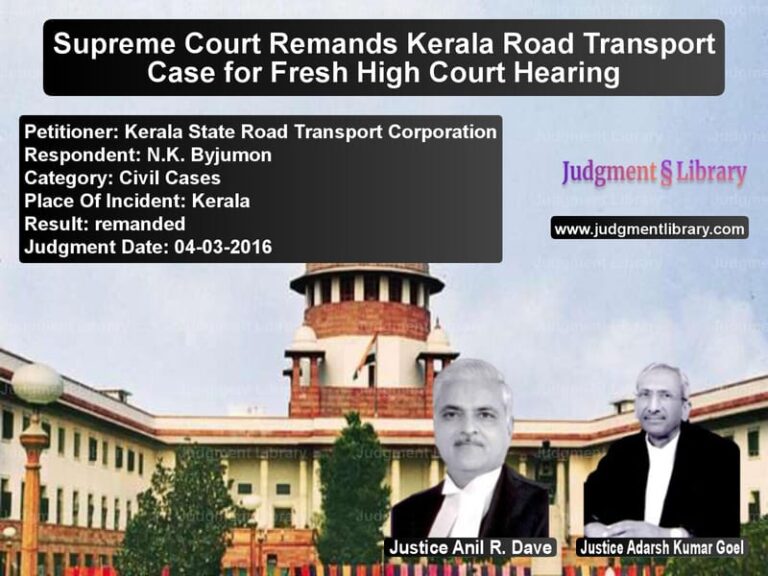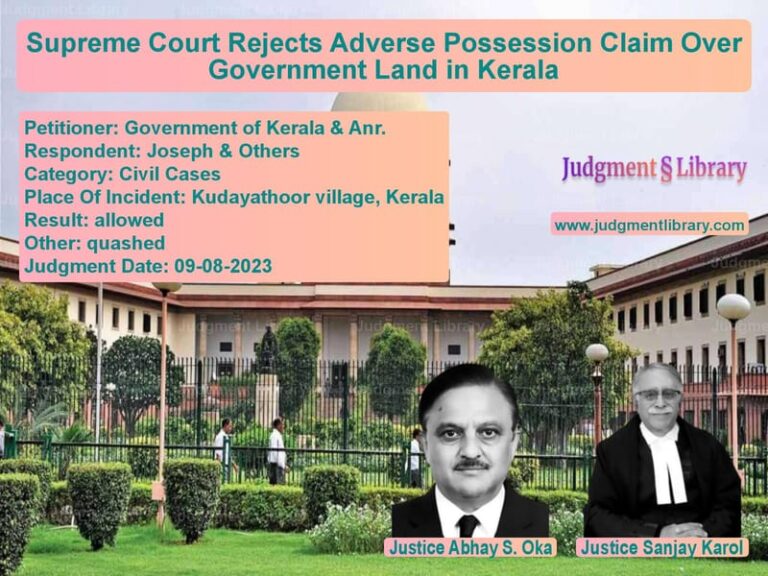Supreme Court Acquits Man Convicted Under Unlawful Assembly in Murder Case
The case of Taijuddin vs. State of Assam & Ors. revolves around a violent land dispute that led to the brutal killing of Abdul Wahab. Initially convicted under Sections 147, 148, 302, and 201 read with Section 149 of the Indian Penal Code (IPC), the appellant, Taijuddin, was sentenced to life imprisonment. However, the Supreme Court, upon reviewing the evidence, found that the appellant’s mere presence at the crime scene and pointing out the location of the victim did not establish his participation in the unlawful assembly with the common object of murder. Thus, his conviction was set aside.
Background of the Case
The dispute arose over the construction of a house on land allegedly owned by the victim, Abdul Wahab, and others. On the fateful morning, a large group of people, armed with weapons such as lathis, spears, and daggers, surrounded the house where the victim was hiding. The attackers broke down the walls of the house and launched a violent assault, eventually carrying Wahab’s body away and disposing of it in the Brahmaputra River.
The police registered Case No. 145 of 1998 at the Bagbar police station under various sections of the IPC, including murder, rioting, and destruction of evidence. A total of 32 accused were convicted by the Sessions Court and sentenced to life imprisonment.
Read also: https://judgmentlibrary.com/supreme-court-grants-bail-in-uapa-case-emphasizes-right-to-speedy-trial/
High Court’s Ruling
The convicted individuals appealed to the Gauhati High Court. While hearing the case, the High Court acquitted some of the accused based on the benefit of the doubt. However, it upheld the conviction of others, including Taijuddin, relying primarily on witness testimonies that he had pointed out the victim’s location to the attackers.
Subsequently, several unsuccessful appeals were filed before the Supreme Court. However, in the case of Taijuddin, notice was issued due to the limited role assigned to him in the alleged offense.
Arguments Before the Supreme Court
Arguments by the Appellant
The counsel for the appellant argued that:
- None of the victim’s family members (PW-3, PW-6, PW-10, PW-11) mentioned Taijuddin’s name in their statements.
- Only PW-1 (the informant) and a few other witnesses (PW-4, PW-5, and PW-15) testified that the appellant had pointed out the victim’s location.
- There was no evidence that the appellant carried a weapon or actively participated in the assault.
- His mere presence at the site did not make him part of the unlawful assembly with the common object of killing Abdul Wahab.
- The house where the victim was hiding was located near the appellant’s residence, explaining his presence.
Arguments by the State of Assam
The prosecution contended that:
- The appellant actively assisted the attackers by identifying where Abdul Wahab was hiding.
- The accused mob, after being directed by the appellant, immediately broke into the house and killed the victim.
- Since he accompanied the group, he was part of the unlawful assembly.
- His conduct showed that he shared the common object of killing the victim.
Supreme Court’s Judgment
Failure to Establish Common Object
The Supreme Court analyzed whether pointing out the victim’s location made the appellant complicit in the crime under Section 149 IPC. The Court ruled:
“The mere fact that the appellant was not brave enough to conceal where the victim was hiding does not make him a part of the unlawful assembly.”
Contradictory Testimonies
The Court found inconsistencies in witness testimonies:
- PW-8, who initially claimed to have seen the appellant with the mob, later admitted that he only heard about the incident from others.
- PW-7, another key witness, was declared hostile.
Given these inconsistencies, the Court ruled:
“The reliance placed in the impugned judgment on the testimony of PW-8 to rope in the appellant under Section 149 IPC cannot be sustained.”
Acquittal Based on Precedents
The Supreme Court referred to Subal Ghorai vs. State of West Bengal (2013), which held that not every person present at the crime scene is necessarily guilty of the unlawful assembly’s common object.
The Court also cited Ranjit Singh vs. State of Punjab, noting that large-scale conflicts in villages often lead to wrongful implication of individuals who were merely present but did not actively participate.
Key Takeaways from the Judgment
- Mere presence does not imply guilt: The Supreme Court reinforced the principle that a person cannot be held criminally liable merely for being present at a crime scene.
- Common object must be established: For a conviction under Section 149 IPC, the prosecution must prove that the accused shared the intent to commit the offense.
- Unreliable witness testimony weakens the case: Contradictory statements from witnesses played a crucial role in the acquittal.
- Presumption of innocence: The benefit of the doubt should always go to the accused if the prosecution fails to present conclusive evidence.
- Judicial scrutiny in mass violence cases: The Court recognized the tendency to implicate bystanders in cases involving mob violence.
Final Verdict
The Supreme Court allowed the appeal and acquitted Taijuddin, setting aside his conviction under Sections 147, 148, 302, and 201 IPC.
Conclusion
This judgment reinforces the importance of clear and convincing evidence in criminal cases. It ensures that individuals are not convicted merely for their presence at the crime scene unless their participation in the crime is unequivocally established.
Petitioner Name: Taijuddin.Respondent Name: State of Assam & Ors..Judgment By: Justice Sanjay Kishan Kaul, Justice M.M. Sundresh.Place Of Incident: Bagbar, Assam.Judgment Date: 01-12-2021.
Don’t miss out on the full details! Download the complete judgment in PDF format below and gain valuable insights instantly!
Download Judgment: taijuddin-vs-state-of-assam-&-ors-supreme-court-of-india-judgment-dated-01-12-2021.pdf
Directly Download Judgment: Directly download this Judgment
See all petitions in Murder Cases
See all petitions in Bail and Anticipatory Bail
See all petitions in Judgment by Sanjay Kishan Kaul
See all petitions in Judgment by M.M. Sundresh
See all petitions in allowed
See all petitions in Quashed
See all petitions in supreme court of India judgments December 2021
See all petitions in 2021 judgments
See all posts in Criminal Cases Category
See all allowed petitions in Criminal Cases Category
See all Dismissed petitions in Criminal Cases Category
See all partially allowed petitions in Criminal Cases Category







